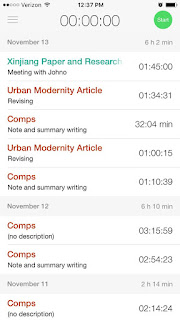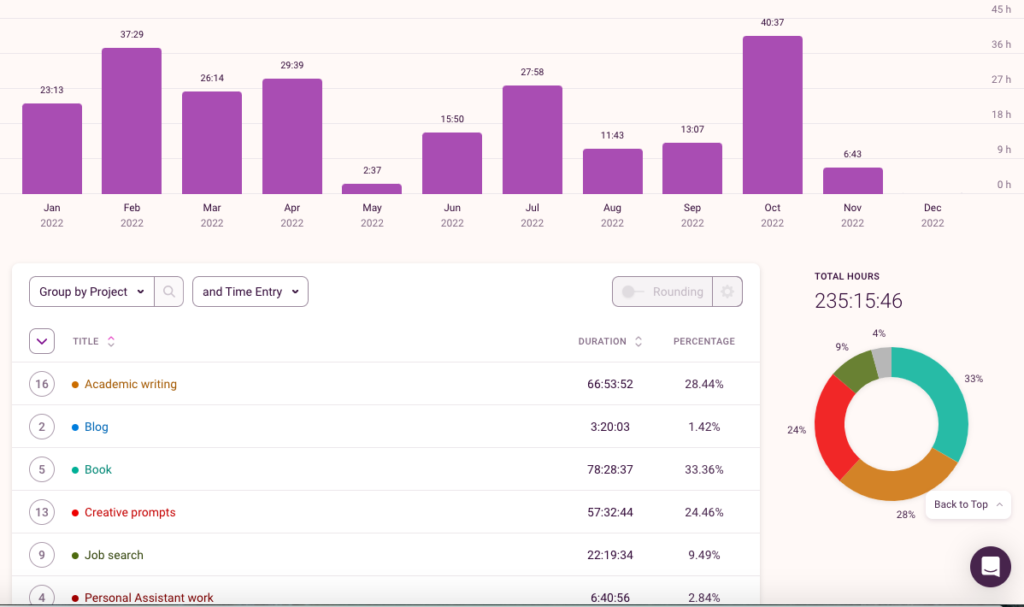Does time seem to slip away from you? You get to the end of a busy day, and you know you did stuff, but you can’t quite say what exactly it was that you accomplished? Perhaps you feel busy, but not productive?
“I’ve been working 80-hour weeks,” you complain-brag to your friends. (By the way, 80 hours a week means you are working 11.5 hours a day, every single day of the week. Is that really accurate? More on that in a moment.)
You feel haggard and burned out. It feels like work is never-ending and the to-do list keeps getting longer. There is no end to the constant cycle of work. You feel like a hamster on a wheel, constantly working but never actually going anywhere. You dream of a day when you can have just a 40-hour work week.
These symptoms of feeling frazzled and overworked are an unfortunate reality of our globally exploitative capitalist system. I am not denying that you might be in a toxic work environment that is taking advantage of you. If you really are working 80-hour weeks, I highly suggest you take a serious re-evaluation of your potential workaholism and consider the health impacts that working nearly 12 hours every day might be having on your physical and mental health, as well as interpersonal relationships. I acknowledge that having the time and space to evaluate and re-consider your life choices in such circumstances is a privilege that only a lucky few can afford. Many people all around the world are forced into jobs and actual slavery where they have no choice but to work in such conditions. This is cruel and unfair, and we should all be working to create a more just and equitable world where humans are treated with the dignity that they deserve with the time and space to love and live for at least a couple of hours a day.
Okay, now that the disclaimer is out of the way. Except for in extreme circumstances, these feelings of being frazzled and over-worked where time is slipping through the cracks without any tangible outcomes, especially if you are in academia, might be starting to creep in when two things are happening: First, work-life balance boundaries are perhaps not being respected. You might be letting work take over your life. You might need to be more firm with your boss, co-workers and self about shutting things down a bit earlier each day. Second, you might not be aware of where your time is going and what you are doing with your time. You know you’re doing stuff, and you know you’re very busy, but you’re not fully conscious of what exactly.
Practicing time management is one way to become more aware of your time and making sure that work doesn’t take over your life. Self-aware and mindful time management is key to maintaining your sanity in academia.
However, healthy time management is one of the hardest, most elusive, and most important things to practice as an academic. Healthy boundaries with your time is extremely difficult in academia–or, any salaried position, really–because there is no time card to punch in and out of work, and there is a feeling of guilt that follows us everywhere when we’re not working. Maintaining healthy time management habits are key for keeping the work/life balance in check.
My #1 tip for becoming more mindful of your time and where it’s going? Track it. When you get to 40 hours, YOU STOP. (Again, I recognize that this is privilege. If you have that privilege, by God, please take it. Use the extra hours to volunteer or be an activist if you are feeling guilty about all the extra time you have.)
Keep track of the time when you’re actually working. This is my NUMBER ONE piece of advice for productivity, accountability, and stress relief.
“Stress relief??” you might be thinking, “Keeping track of my time sounds like a stressful way to add another app to my phone and add another thing I have to do.”
But YES, STRESS RELIEF. Because sometimes we stress ourselves out thinking, “OMG I didn’t work enough this week!” when in actuality we did 60 hours of work and it’s time for a break.
Or, sometimes we end the week exhausted, thinking to ourselves, “OMG I’m soooo over-worked!” when in reality we only did 30 hours of work, and we didn’t even realize it but we spent 20 hours organizing and reorganizing our inbox, reading BuzzFeed and stalking our ex on facebook.
For this technique to work, you must first define what you mean by “work.” Then, create categories for your main tasks. You’ll want to prioritize doing intellectual tasks associated with your research, whether it be brainstorming, analyzing, writing or revising. Teaching is another bucket. Checking email, completing administrative tasks and going to meetings is another bucket. It’s all work, but at the end of the week, you can see where most of your time is going. Here is what it might look like:

Time tracking is a fantastic reality check that makes sure you’re actually doing work and makes sure you’re not over-working yourself either. Kind of like calorie counting your food.
I use the software tool / app called Toggl. You can create projects in the app. This will divide the time you spend working into different categories.
I only have the clock running when I’m actually doing work–not when I’m walking through campus, getting a cup of coffee, eating lunch, going to the bathroom, or talking with friends. Only when I’m actually doing work is the clock running. I usually shoot for 40 hours of real work a week. For me, 40 hours of “real” work time usually translated into more than 60 hours in the office a week, but I only have the clock running while I’m actually working. Because I take regular breaks (plus I usually have to run around campus for something), I’ll usually get 8 hours of work done for every 10 hours I spend at the office.
After you do this for 1 week, you might be surprised by how much work you’ve been doing–or by how little work you actually do during the week. Try it out! Like a calorie counter, it can be quite illuminating to do it just for a week or two to see where you’re at. And chances are pretty good, that despite how good it feels to brag that you’ve been working 80-hour weeks, it’s probably not accurate unless you are on speed or actually are a robot.
For me, I’ve been tracking my time for years, and it’s fun to see the graphs and calculations at the end of each year, or at the end of each project. For example, here is what my year looks like so far with some of my projects.
I had surgery and started a new job in May and had a busy month in August getting married. On the other hand, in October I spent 10 days traveling for my honeymoon and it was still one of my most productive months. Why? Because I was working on exciting and creative projects where I was energized and motivated. It’s so fun to see the upward and downward trends throughout the year:

And in the same way that calorie counting your food can be triggering for someone with disordered eating, counting your time can provoke all kinds of anxious feelings and bring up doubts about self-worth. Proceed with caution if you have anxiety or OCD. Like anything, this must be done in moderation. You don’t have to stop the clock every time you look out the window to day dream. And you don’t have to track everything.
Start with tracking one of your projects. See how much time you actually work on it throughout the week. The goal is not to become a robot who is constantly trying to beat the clock. The goal is to create boundaries and awareness around what we are doing with our time and why so that we can start creating the life that we want to lead.
